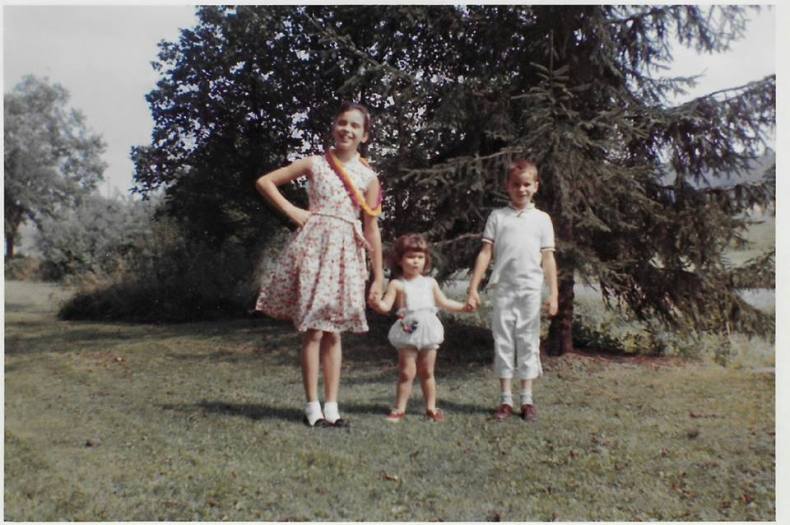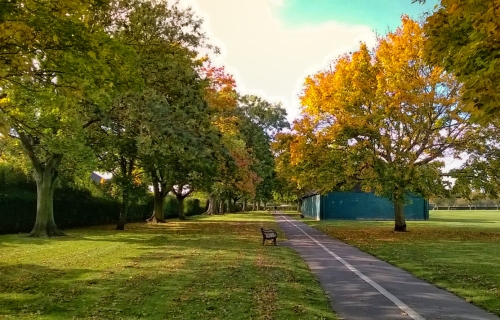Avto was a postman from Georgia.
“Zee country, not zee state,” he explained—immediately upon meeting my nephew Dave and me, one winter morning in Estonia—just in case the thick accent wasn’t clarification enough.
Avto spoke many languages, presumably, all with a similar poetic license that left his English understandable, although not necessarily in any rational way.
Since Avto pronounced my name Holy, the nickname he gave me was Hole. I intended—from his first mention of my new nickname—to nudge him away from it. But he said it with such endearment, like he’d bestowed me with something heartfelt and personal … So I postponed voicing my opposition.
“Your need is fresh air, exercise and light, every day. But present you have no zis,” Avto announced, shortly after our first meeting. He then added, clapping his hands, as though this thought had just surfaced from nowhere, ”Oh my God! I can solve you zis only problem you has, Hole.”
“Um … about that name … never-mind, we’ll talk later; just how will you solve this problem, I didn’t know I had?” I asked.
“I vill let you walk wis me on my mail route when I deliver every day post and pension money one time in month. And sometimes I help zese old people wis life. You vill see inside of houses and pet cats and maybe have tea wis us … .”
Looking back, there was an uncharacteristic heave-ho to caution, followed by a gigantic leap of faith, that led me to even consider this proposal. But Avto’s simple approach to life and complete lack of malice were apparent in every gesture and intonation.
So I surrendered, almost immediately to his plan, after all I had no real plans of my own: I had no roadmap in this strange new life I was creating after my husband’s death; no role models … My life in Estonia was, at times, confusing and frightening, but it was also supremely exhilarating. I was writing a new book—as opposed to a new chapter—in my life. What better vehicle to begin a new journey, than my feet? And what better co-traveller in those early years, than The Postman?
Estonian sunrise, in late November, is said to occur between 8:00 and 8:30 AM. My experience was, however, while there may have been a glimmer of daylight at that hour, to call it sunrise was wishful thinking.

Getting out from under my woollen blankets, at 6 AM, in -30 degree Celsius (-22 F) temperatures, so that I could meander through the streets of Souptown, helping deliver Avto’s post, in the dark, pretty much shattered my middle class American comfort zone. In spite of the discomfort, however, I donned as many layers of clothing as would fit beneath my bulky arctic jacket, pulled on my warm LL Bean boots, and a hat my mother gave me, ignored my frequently frozen eyelashes and numb appendages, and silently made my way up and down the streets of Souptown almost every morning the winter of ’97.
Avto was born and spent his youth in Georgia. He’d come to Estonia to attend university. During his time in University, the Soviet Union collapsed and he was now, more or less stuck in Estonia. He longed to go back to his motherland, it’s sweet wine, warm weather and gregarious culture; his emotional life was a mixed bag. While he frequently referred to Estonia as “Zis cold, fucking Soviet country,” it was very much a love/hate relationship. He loved the all night sun of summer, the saunas, and the calm, peaceful nature of the Estonian people. He did however, complain almost daily in the winter; “One day, zese balls in my pants vill freeze off! People vill say, ‘Oh look! Vhat that is lying in ze snow over zere? Oh never-mind; zey is just zee balls of zat underpaid postman.”
Avto and I began our mornings on a specified corner, after he had collected his post, organised his pouch and begun his route.
We had followed this same routine for about a month when, one morning, Avto failed to show up on our designated corner. I went from annoyed to worried after ½ hour or so of waiting in the cold. I walked through Souptown on my way home but there was no sign of my missing postman. I waited to hear from him; or perhaps the police …
On one of my future visits to the States, an elderly fundamentalist pastor would ask me if the Estonian people were religious. Not knowing one Estonian who professed a belief in God, let alone one who had probably ever seen the inside of a church, I would say, “No, they aren’t,” But then feel compelled to add: “But I’ve never lived in a more spiritually attuned society.”
Later that evening, Avto showed up at my flat, looking exhausted and 10 years older.
“I’m apologising and sad for my late self …” he began.
“I can only assume there was a reason that I stood on that corner alone and froze,” I interrupted.
Avto began his explanation slowly, as though the energy it took to speak was being borrowed, from somewhere outside of himself, a word at a time. “When I was early walking street zis morning, wisout you, a grandmother came running to me wis tears. She say her husband he died in zis night. She was alone and crying all night … alone wis zee body of her man. All night …” he repeated.
“What did you do?” I asked, my tone transformed.
“I say, ‘Babushka, vhat I can do for you?’ and I hold her cold hands. When such terrible sings happen, hands are wery cold,” he explained, in case I didn’t know what shock was. Then, “Also it vas -25 degrees in zis cold, fucking Soviet country,” he added, in case I hadn’t noticed.
“So what did she ask for?” I could barely speak.
Avto then explained that the old woman had tried to clean her husband’s body, herself, but had “wery old hurting bones” and lacked the strength … So he, The Postman, had gone into her home, made tea, and spent the next several hours helping the grieving widow clean and prepare her husband’s body for his funeral.
When he’d earlier claimed “I sometimes I help zese old people wis life,” I’d not understood what that meant. How could I have understood, when my life had never included most of the day to day experiences that lived in my new world?
I looked at My Postman, in fact my world, differently after that day.
“Hole, I is so sorry you poor little feet froze off, waiting for me.”
“My feet are not little and you have no need to apologise. I admire you so much,” I said.
Avto looked at me inquisitively. “Huh?”
“What you did today, was so beautiful and so loving … so sacred. What you did was what religion tries to instil in people … .” I stopped; words failed me.
He continued looking at me with his compassionate, exhausted, still puzzled, face.
Suddenly I wanted to offer something useful. And expensive. The best I could do, when someone was in crisis, was offer something of material value; it was how I supported people; the more expensive the better. “Hey, I think I’ll give you my LL Bean Boots. Your boots are shot and I have another pair I can wear.”
I instantly felt better for having offered.
“Um, zose boots are wery not cool …” he said sheepishly. “I did not tell you but you embarrassing me in zose boots.”
Huh! I thought. So my do-gooder self is out-a-luck, today, since My Postman has a fashion sense that doesn’t allow for pricey LL Bean boots because they’re uncool. Interesting!
“It doesn’t matter, Avi,” I said. “I made soup; do you want some?”
“Oh Hole, you know I do! You is zee soup master!”
It was about this time that I realised: I was in the process of a rebirth. And, so, actually a new name was called for; even if it was Hole.





